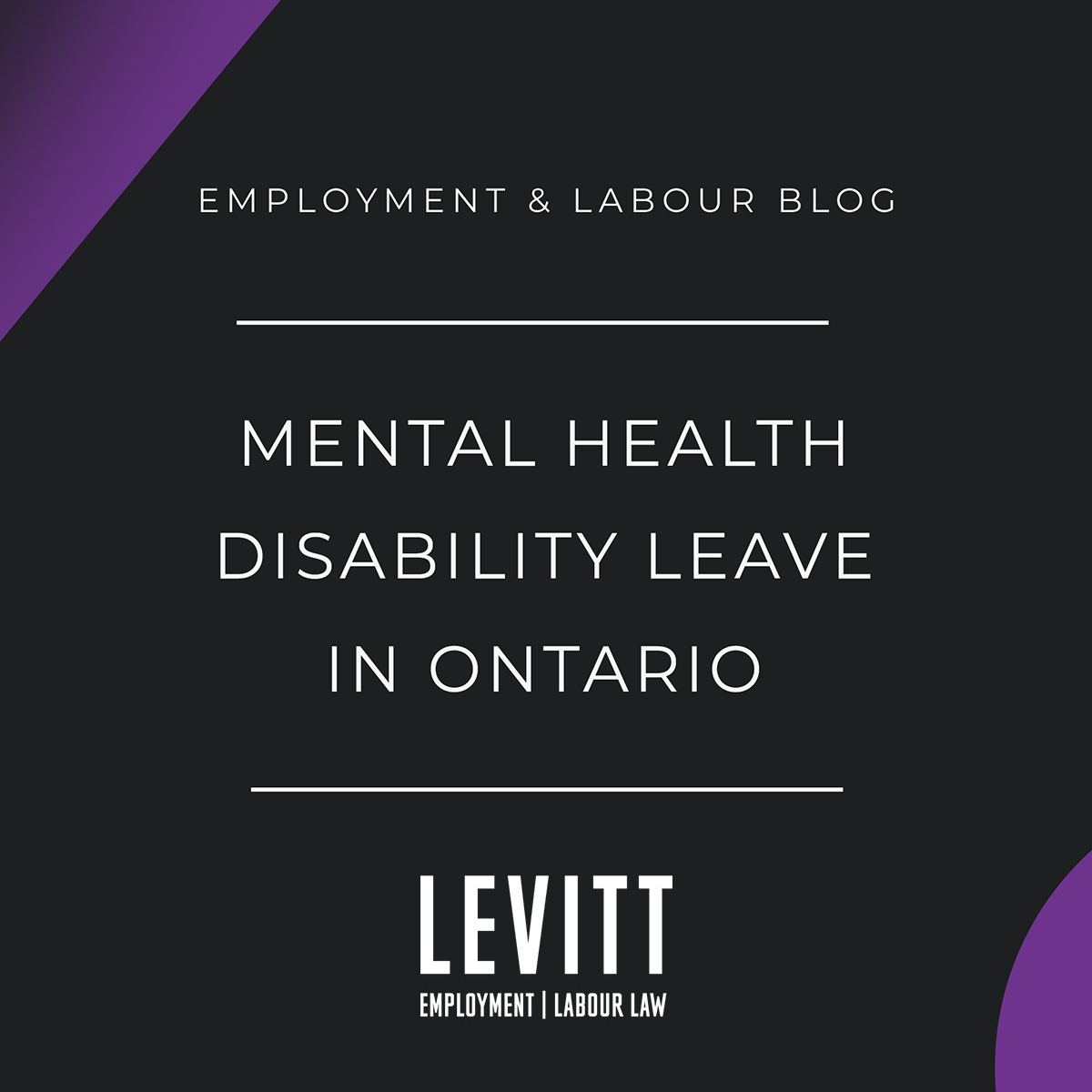Disability Benefits for Mental Illness
Introduction
According to a report by the Mental Health Commission of Canada, mental health problems are the number one cause of disability in Canada. An estimated 30% of short-term and long-term disability claims in Canada are attributed to mental health issues. Workplaces and employment environments can play a big part in mental health struggles, as most adults spend the majority of their days at work. Fortunately, employees can claim disability for mental health issues.
This article will look at mental health as it relates to disability claims, focusing primarily on stress and anxiety. For more on short- and long-term disability click here (hyperlink to What’s the Difference between STD and LTD article). If you have more questions about mental health-related disability claims, get in touch with one of our lawyers today.
What is Mental Illness?
- Disabilities which affect a person’s brain or mind.
Mental illness is a term used to describe several disabilities which affect a person’s brain or mind. While some mental illnesses have physical symptoms, the underlying cause is psychological. Mental illness covers a wide range of disabilities including ADD/ADHD, Alzheimer’s, Depression, and Anxiety. When it comes to workplace-related mental health and disability claims, stress and anxiety are the most common.
Is Mental Illness a Disability?
- Yes, if it prevents you from performing your job.
Yes, mental illness can be a disability. If your mental illness is so great that it prevents you from performing your job effectively or at all, it is a disability. In that way, mental illness is no different than a physical disability.
What is Anxiety?
- A general feeling of worry about everyday life.
Anxiety is one of the most common mental health disabilities, so we will use it as an example to look in-depth at mental health-related disability in general. For the purposes of this article, it is not necessary to take a deep dive into what anxiety is from a psychological or neurological point of view. The symptoms of anxiety vary, but in general terms anxiety is a general feeling of dread or excessive worry about aspects of everyday life. These feelings can become constant and overwhelming. While many people have moments of anxiety, not all anxiety is a disability.
When Does Anxiety Become a Disability?
- Anxiety (or any other mental health issue) becomes a disability when it interferes with a person’s ability to perform the duties of their job.
When does anxiety cross the line from a normal human reaction to stress into the realm of a disorder which qualifies as a disability? Anxiety rises to the level of a mental health disability when it changes from a temporary feeling or reaction to a stressful situation to a diagnosable mental disorder which interferes significantly with the person’s ability to function normally. In employment terms, we might say that anxiety becomes a disability when it interferes significantly with the person’s ability to perform the regular duties of their job.
An important factor in making this determination is the duration of the feeling, not necessarily the intensity. For example, a person may feel intense anxiety about a certain upcoming social interaction or a big deadline at work. This would not be considered a disability. Although the feeling is real and intense, it is only temporary. On the other hand, were that same person to feel that same level of anxiety constantly without change, their anxiety could be considered a disability. In that case, the anxiety has risen to the level of a disability because the feeling is ongoing and constant. Constant feelings of anxiety could interfere with a person’s ability to do their job.
Can I Claim Disability Benefits for Mental Illness?
Yes, employees can claim disability for mental health issues. Both short- and long-term benefits are available for mental health-related disabilities, if employees are covered by a health benefit plan that provides those benefit programs. As with a physical disability, it is up to your insurer or employer to approve or deny these benefits.
Challenges to Getting Benefits
- Mental health is invisible, making insurers more likely to deny benefits.
Getting approval for a mental health-related disability claim is often more challenging than physical disabilities. Insurers and employers are more likely to resist mental-health related claims because mental health disabilities are invisible. Most physical disabilities have outward, clear manifestations that are easy to see and hard to deny. Mental health disabilities, like anxiety, often have no physical manifestation. This makes it easier for insurers and employers to deny mental health disability claims. No matter how severe your anxiety is, a disability provider may be highly skeptical of your claim. If you think you have been unfairly denied disability benefits for your mental illness do not hesitate to contact one of our lawyers who would be happy to assess your matter.
What Do I need to show that I have a mental illness-related disability?
Due to the unique challenges described above, obtaining medical evidence to substantiate your claim is integral to a mental health-related disability claim. Getting a medical note from your doctor affirming and substantiating your mental health claim can make or break a disability claim. The medical evidence should show that you have a medically supported restriction or limitation that prevents you from working, or requires an accommodation. The evidence should show how the illness impacts your ability to perform the essential duties of your job. Without medical evidence, insurers and employers will not approve your claim.
Next Steps
If you think you may have a mental illness that is preventing you from effectively performing your job duties, you should contact one of our lawyers today. Alternatively, check out our helpful article on stress leave (hyperlink to Stress Leave blog) to learn about leaves of absence.
DISCLAIMER:
Remember, this article provides only general information and is not a substitute for legal advice. If you have a legal problem, you should seek out legal advice before making any decisions.

